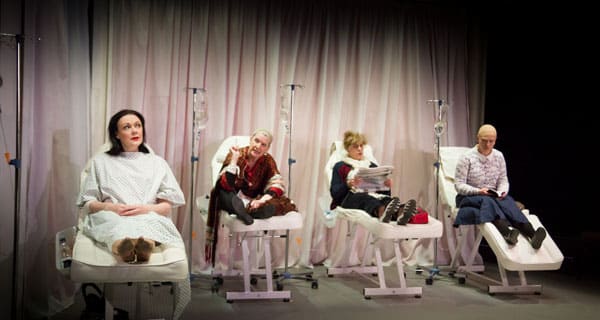
Happy Endings
Arcola Theatre
10 February 2015
1 Star
We are in a cancer treatment ward. There are four patients, each undergoing chemotherapy. One, born in Auschwitz, is determined not to let Cancer win. One, a very devout wife and mother, studying to be a Rabbinical Judge, is praying for salvation. One considers Cancer a gift, a wake-up-and-smell-the-roses-and-live-life-to-the-full kind of gift which reunites parent and child and ensures care and love. One is an actress.
She decides, after interval as it happens, that she doesn’t want to have the Chemotherapy; she wants to be her own woman, to dance at her daughter’s wedding in a fortnight and have a quality to her life she would be denied if she continued with the debilitating Chemotherapy. Her Doctor argues with her, tries to reason with her. He asks her, rather angrily, whether she imagines that 57 male virgins will await her in Heaven. In the play’s funniest moment, she responds “57 male virgins is my idea of hell”.
This is Happy Endings, billed as a new musical, and currently playing in Studio One at the Arcola Theatre. Written by Anat Gov, an award-winning Israeli playwright, it is described as “a musical-comical fantasy about a subject that people don’t talk about”. The programme is silent about who was responsible for the translation of dialogue and lyrics, but it seems unarguable that a deal has been well and truly lost in translation. By way of example, this is an actual lyric:
“You may feel a little grumpy,
When you find a little lumpy.”
Yep.
It’s not a musical; it’s a play with a few, poor, pastiche numbers. It’s not very much a fantasy either, although there are two, odd, fantasy song sequences :one involves an apparently vain and arrogant Doctor; the other features Cancer, complete with crab claws in some curious Astrological reference, as a kind of Latino dancer. Both sequences are enervating – and not because of the performers or the choreography (Jordi Guitart).
In the programme, Gov is quoted as saying: “I wish mainly to discuss the subject – to say the word ‘Cancer’ without being afraid…I hope that people leave this play with less fear of cancer and of death in general. It raises questions about what life is about and whether you are willing to live at any price”.
This production, however, raises questions about what theatre is about and whether you are willing to sit through lamentable theatre at any price. And answers them.
As translated, the material here is seriously deficient. Much of the first Act is pointless and uninteresting. If it was judiciously cut and re-shaped into a 70 minute piece, this two hour slow walk through the Cancer ward might just work in accordance with the author’s stated intentions. The second Act contains some interesting material as the actress tries to convince her fellow-sufferers and the hospital staff that she is not mad, that Chemotherapy is not the path she chooses to take to meet her maker. Hard issues are debated, including the way fear of insurers and litigation affects the way medical services are dispensed.
You can see that the dancing Cancer man could easily have a tango with each of the four patients, perhaps the staff too, as a clever way of showing how lives were affected by the disease. The fantastical elements could drive the narrative more deftly. Probably without crab claws though.
But, as it stands, the work meanders and only occasionally shows signs of interest or life.
Director Guy Retallack must bear the brunt of responsibility here. In the programme, Retallack waxes lyrical about the “acuity and wit” underpinning the text, but his production is bereft of both and certainly does not illuminate or make resonate whatever he sees on paper. A dreary fantasy offers no pleasure or insight.
Gov’s idea – a confrontational musical fantasy dealing with the realities of Cancer, Cancer treatment and human responses to both – is inspired. In the second Act of Happy Endings there are flashes of the truth, pain and insight that Gov, who died of Cancer in 2012, brought to the enterprise.
If Happy Endings is to have a happy ending, it needs a good dramaturg for this translation. The NHS should fund it, because if Gov’s idea was given potent life, it would be compelling, essential viewing.
Happy Endings runs until March 7, 2015. Visit the Arcola Theatre website.
